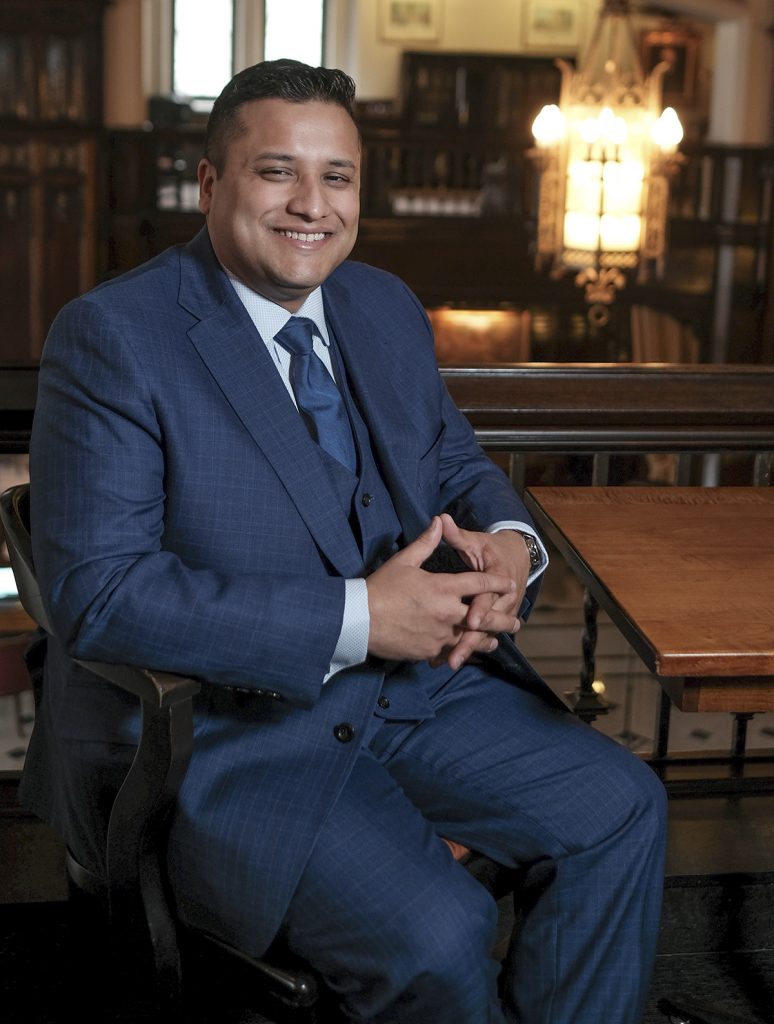Subscriber Benefit
As a subscriber you can listen to articles at work, in the car, or while you work out. Subscribe NowAlfredo Estrada began law school after a career working in the northwest Indiana steel mills — an experience he says forged in him a desire to “make a difference at a different level.” As a passionate practitioner of immigration law who also has a vital practice in municipal law, Estrada is making a difference for numerous families and communities in Lake County and The Region of northwest Indiana. The Valparaiso Law School grad is also active in local bar organizations and as a community and pro bono volunteer.
How did your prior career in the northwest Indiana steel mills lead to a career in law?
I was a steelworker at United States Steel, East Chicago Tin, as a crane man for eight years prior to leaving to attend law school at Valparaiso University School of Law. During my tenure at USS I noticed that issues/areas of concern and my opinion on them were not addressed. This led me to determine that obtaining a juris doctorate and practicing law would provide me the tools required to make a difference at a different level.
What led you to the municipal law practice area?
My interest in my community. Town/city councils, park boards, BZAs, plan commissions and redevelopment commissions perform the work that make a town/city work on a daily basis. The process has always fascinated me.
If you could change one law, what would that be?
Comprehensive immigration reform. A pathway to citizenship for Dreamers; updating the LIFE Act (245(i) adjustment), which enables certain individuals who are physically present in the United States to pay a penalty and receive adjusted status in the United States; a transfer of current immigration courts from the Department of Justice to a separate Article 1 Immigration Court with a trial and an appellate division; repeal of 8 U.S.C. § 1325, thus ending family separations and detention of children; and strengthening and funding the security of our borders and ports of entry in a humane way.
How has the immigration law practice changed in the five years you have been an attorney?
A lot. Fundamentally, it has become more difficult to legally immigrate to the United States, and there has been a shift from a family-based immigration system. Of most concern is the amount of change in immigration law solely through the executive power. Congress and its lawmaking authority have been bypassed.
Where do you see yourself professionally in another 10 years?
Most likely in my current position as a partner at Burke Costanza & Carberry LLP. I really enjoy practicing law at BCC. But maybe on the 7th Circuit Court of Appeals or in the United States Senate. Who knows? “God laughs at plans.”
Who is someone who mentored you, and what did you learn from them?
Professor Valentino Martinez, professor at Purdue University Northwest. Professor Martinez retired from the State Department and began teaching at Purdue Northwest. I learned a lot from Professor Martinez. One thing that I remember today and pass on is, “Speak with a little bit more authority and air of confidence than the rest.”
Why is bar association involvement important to you?
Bar associations perform a vital function in the legal profession. It is the central point of engagement for attorneys for networking, CLE and staying informed on developments in the law and/or legal trends. Involvement in bar associations allows you to provide better legal services to your clients.
As a Valparaiso Law School grad, how do you feel about the school’s closing?
I am disappointed. My time at Valparaiso School of Law was nothing but positive. The closing will make it more difficult for those in The Region who choose an unconventional route to the practice of law to find that path. It’s a loss to the state and The Region.
What advice would you give your younger self?
You will have success and failure. Don’t focus on either too long, and share them both with those you love.
What do you most like to do when you have free time?
I am married and have three daughters. When I am not at the office, I generally find myself serving as their chauffeur. They get all my attention and govern my “free time.”•
Read more Leadership in Law profiles.
Please enable JavaScript to view this content.

